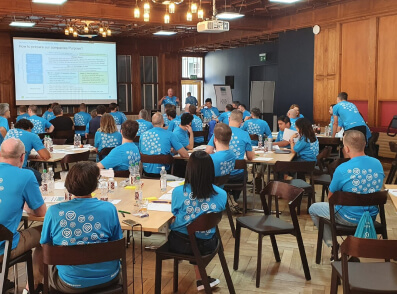Uncertainty is inherent to the life and health insurance industries. Life and health insurers are ready for a new generation of technology that can help their customers better quantify their health behaviors and optimize their lifestyles — thereby reducing insurers’ uncertainty when calculating risks, morbidity, and mortality. For years, dacadoo has been innovating and using the latest technology to help insurers engage their customers to do just that.
Our new free whitepaper discusses how dacadoo’s innovative and holistic offerings help insurers empower their users through personalized and engaging technology and rise to the occasion of big data to improve their overall risk assessments.
Here’s a sneak preview of a few of the whitepaper’s key insights.
Real-Time Pricing Based on Context
Researchers estimate that, by 2025, almost 30% of all data created, captured, or replicated by consumer devices (such as smartphones, home appliances, or medical devices) will be created in real-time. These vast amounts of big data may dramatically reduce uncertainty and help insurers finely hone their risk assessments and personalize their insurance offerings when analyzed strategically.
With this emerging trend in mind, dacadoo has created their Risk Engine, which enables accelerated underwriting and dynamic pricing based on a user’s real-time health data inputs, such as sleep, nutrition, or physical activity. In addition to reducing uncertainty for insurers, this dynamic scoring system affords customers a novel “pay as you live” model (à la the car insurance industry’s “pay as you drive” model). Users can view their real-time Health Score (calculated from 0 to 1,000) and witness firsthand how various tweaks to their daily habits can alter their performance.
The Future of Adaptive Insurance Models
The insurance industry does not operate in a silo, and it is susceptible to the cultural shifts and advancements occurring in the world at large. While the increasingly hyper-connected globe may seem to threaten the traditional insurance business model, savvy insurers may see the proliferation of data sources as an opportunity for more insurance touchpoints.
dacadoo’s Wheel of LifeTM digital health engagement platform (DHEP) offers life and health insurers an opportunity to innovatively engage with consumers, providing motivation and feedback to users to encourage and reinforce healthier lifestyles. The insurance industry’s future hinges on precisely this type of adaptive, lifestyle-based interaction, with technology enabling added value for both insurers and users. dacadoo’s products are specifically created to leverage technology to increase customer interfacing, enabling insurers to deliver new touchpoints and derive more personalized risk assessments and risk modification.
Tailoring to Phases of Life
Customers evolve through numerous phases of life, and, as they do, their health and life insurance risks evolve as well. However, standard underwriting models and processes cannot fully take into account the variability of human behaviors, and health risk quantification suffers as a result. dacadoo’s Risk Engine can overcome the challenge of following consumers through various life phases — and supporting them with different types of insurance and personalized offerings along the way — because it creates models based on clinical research and uses advanced metrics based on 300 million person-years of scientific data to fill in the gaps.
How the Health Score Relates to Health Care Savings
Non-Communicable Diseases (NCD) are the leading cause of death, accounting for 71 % of all deaths globally. Four out of the five top risk factors contributing to the global disease burden are caused by modifiable lifestyle behaviours linked to NCD, namely: high systolic blood pressure, smoking, high fasting plasma glucose and high body-mass index.
In our white paper we show you how our Data Science team has demonstrated that higher dacadoo Health Scores correspond with lower health care costs.
For more information about how dacadoo’s technologies can help life and health insurers improve their digital health engagement efforts, implement health scoring technology, embrace real-time personalization of risk, and drive down future expenditures, download our free white paper today.














